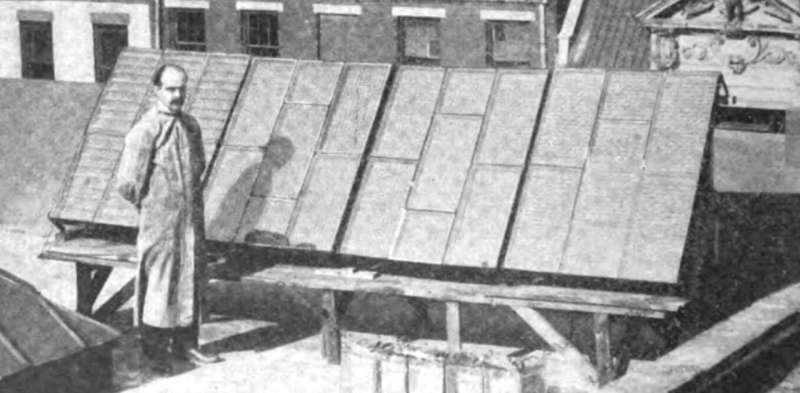
One argument put forward in defense of fossil fuels is that they were a historical necessity, because there was no other viable substitute for much of the 20th century. We owe fossil fuels a debt of gratitude, the argument goes, because they supercharged our development. But what if I told you there was a viable alternative, and that it may have been sabotaged by fossil fuel interests from its very inception?
While researching the economics of clean energy innovation, I came across a little-known story: that of Canadian inventor George Cove, one of the world’s first renewable energy entrepreneurs. Cove invented household solar panels that looked uncannily similar to the ones being installed in homes today—they even had a rudimentary battery to keep power running when the sun wasn’t shining. Except this wasn’t in the 1970s. Or even the 1950s. This was in 1905.
Cove’s company, Sun Electric Generator Corporation, based in New York, was capitalized at US$5 million (around US$160 million in today’s money). By 1909, the idea had gained widespread media attention. Modern Electric magazine highlighted how “given two days’ sun… [the device] will store sufficient electrical energy to light an ordinary house for a week.”
It noted how cheap solar energy could liberate people from poverty, “bringing them cheap light, heat and power, and freeing the multitude from the constant struggle for bread.” The piece went on to speculate how even airplanes could be powered by batteries charged by the sun. A clean energy future seemed to be there for the taking.
Vested interests?
Then, according to a report in The New York Herald on 19 October 1909, Cove was kidnapped. The condition for his release required forgoing his solar patent and shutting down the company. Cove refused and was later released near the Bronx Zoo.
But after this incident, his solar business fizzled out. Which seems odd—in the years before the kidnapping, he had developed several iterations of the solar device, improving it each time.
I can’t say with certainty if vested interests were behind it. Some at the time accused Cove of staging the kidnapping for publicity, although this would seem out of character, especially since there was no shortage of media attention. Other sources suggest that a former investor may have been behind it.
What is well-known though, is that fledgling fossil fuel companies commonly deployed unscrupulous practices towards their competitors. And solar was a threat as it is an inherently democratic technology—everyone has access to the sun—which can empower citizens and communities, unlike fossil fuels which necessitate empire-building.
Standard Oil, led by the world’s first billionaire John D Rockefeller, squashed competition so thoroughly that it compelled the government to introduce antitrust laws to combat monopolies.
Similarly, legendary inventor Thomas Edison electrocuted horses, farm animals and even a human on death row using his rival Nikola Tesla’s alternating current to show how dangerous it was, so that Edison’s own technology, the direct current, would be favored. Cove’s Sun Electric, with its off-grid solar, would have harmed Edison’s business case for building out the electric power grid using coal-fired power.
While some scattered efforts in solar development occurred after Cove’s kidnapping, there were no major commercial activities for the next four decades until the concept was revived by Bell Labs, the research branch of Bell Telephone Company in the US. In the meantime, coal and oil grew at an unprecedented pace and were supported through taxpayer dollars and government policy. The climate crisis was arguably underway.




























